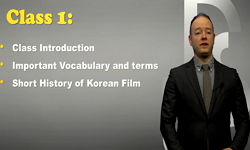In this paper, I propose that national cinema might be discussed as chronotope(Mihail Bakhtin) and performativity(Judith Butler), not as the reflection and construction of national identiy. Why? Because national cinema is the dynamic project and speci...
http://chineseinput.net/에서 pinyin(병음)방식으로 중국어를 변환할 수 있습니다.
변환된 중국어를 복사하여 사용하시면 됩니다.
- 中文 을 입력하시려면 zhongwen을 입력하시고 space를누르시면됩니다.
- 北京 을 입력하시려면 beijing을 입력하시고 space를 누르시면 됩니다.
https://www.riss.kr/link?id=A76149545
- 저자
- 발행기관
- 학술지명
- 권호사항
-
발행연도
2001
-
작성언어
Korean
- 주제어
-
등재정보
KCI등재
-
자료형태
학술저널
- 발행기관 URL
-
수록면
69-106(38쪽)
- 제공처
-
0
상세조회 -
0
다운로드
부가정보
다국어 초록 (Multilingual Abstract)
In this paper, I propose that national cinema might be discussed as chronotope(Mihail Bakhtin) and performativity(Judith Butler), not as the reflection and construction of national identiy. Why? Because national cinema is the dynamic project and specific practice rather than territorial cultural product of the State. Theorizing the performativity of national cinema, this paper propose the new conception of nation, which is not static and mechanical "Imagined Community" (Benedict Anderson), but "Performative Imagined Community" like gender.
For theorizing "Performative Imagined Community", I combine Homi bhabha"s thought of nation with Judith Butler" s thought of gender. Consequently, the nation has ambivalence and limilnal space which is contradictorily crossed and fissured by the pedagogical and the performative, and is the dynamic and discontinuous process that engender unexpected subjectivity through the citation and iterability by agency. Like gender, nation is the changeable and historical constuct which is not fix and unchangeable entity.
In this paper, I analyze the uncanny family film, Father and Sons (Kwon Cheol-Hwi, 1969) as an example of "Performative Imagined Community." In this film, the relation of family is mimicry of the military culture that was started by Park" s a coup detat and spreaded out widely in South Korea on late 60s. Through the ambivalence of mimcry(Homi Bhabha), I analyze process which this film perform the nation. Like a "Drag", that is parodic mimicry of nation is reavealing inconformity, contradiction, and fissure between nation and state. So couling of Nation and State is not nature, essence, and destiny, but disguised character by modem state and capitalism. And by showing unsuccessful project of Park" s regime that interpellate ideologically nation, this film enact that nation is unexpected mobile agency and that national cinema is practice which go beyond homogenizing and nationalizing project by State.
목차 (Table of Contents)
- Ⅰ. 한국영화를 어떻게 말할 것인가?
- Ⅱ. 민족영화의 크로노트프와 수행성
- Ⅲ. 수행되는 상상의 공동체
- Ⅳ. 변종화된 민족의 수행으로서 〈오부자〉의 모방전략
- Ⅴ. 민족은 움직이는 거야!
- Ⅰ. 한국영화를 어떻게 말할 것인가?
- Ⅱ. 민족영화의 크로노트프와 수행성
- Ⅲ. 수행되는 상상의 공동체
- Ⅳ. 변종화된 민족의 수행으로서 〈오부자〉의 모방전략
- Ⅴ. 민족은 움직이는 거야!
- 참고문헌
- ABSTRACT
동일학술지(권/호) 다른 논문
-
영화 미학적 패러다임으로서의 작가주의에 대한 동시대적 고찰
- 한국영화학회
- 김정선
- 2001
- KCI등재
-
- 한국영화학회
- 서인숙(Seo In-sook)
- 2001
- KCI등재
-
- 한국영화학회
- 한우정(Woo-Jung Han)
- 2001
- KCI등재
-
- 한국영화학회
- 김정환(Jeong Hwan Kim)
- 2001
- KCI등재





 DBpia
DBpia


